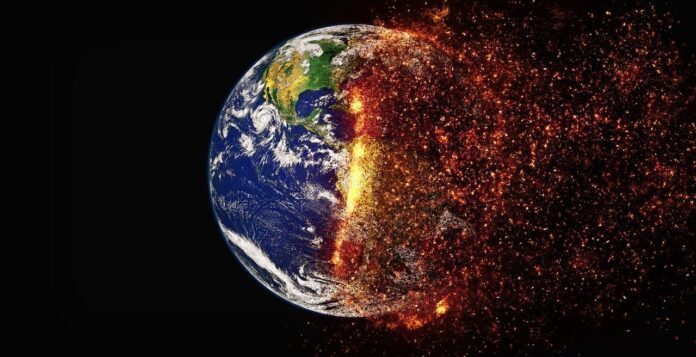The dawn of the 21st century has brought with it a heightened awareness of the environmental challenges that threaten the very fabric of Earth’s ecosystems. As the human population burgeons, reaching over 7.8 billion, the strain on natural resources has escalated, leading to a series of interconnected ecological crises. These challenges are not isolated incidents but are global phenomena that require immediate and concerted efforts to mitigate. The ecological crises of our time are multifaceted, ranging from the warming of our planet to the loss of biodiversity, the proliferation of pollution, the scarcity of water, and the need for innovative conservation strategies. This article delves into these pressing issues, exploring their global impacts, and proposing urgent actions and sustainable solutions.
Climate Change: Understanding the Global Impacts and Urgent Actions Required
Climate change stands as the most formidable environmental challenge of our era. It is a crisis that transcends national borders, with the Intergovernmental Panel on Climate Change (IPCC) reporting a global temperature rise of approximately 1.1 degrees Celsius above pre-industrial levels. The consequences are far-reaching, manifesting in extreme weather events, rising sea levels, and disrupted ecosystems. To combat climate change, urgent actions are required. This includes transitioning to renewable energy sources, implementing carbon pricing mechanisms, and enhancing energy efficiency across all sectors.
The Paris Agreement, adopted in 2015, is a pivotal step towards global climate action, aiming to limit global warming to well below 2 degrees Celsius. However, current national pledges are insufficient to meet this target. It is imperative that countries not only commit to more ambitious goals but also follow through with concrete actions. Investment in green technologies and infrastructure must be scaled up, and deforestation must be halted to preserve our planet’s carbon sinks.
Biodiversity Loss: The Silent Crisis Threatening Ecosystems Worldwide
Biodiversity loss is a silent crisis that is often overshadowed by the more visible impacts of climate change. Yet, the loss of species and habitats is equally catastrophic. The Living Planet Report 2020 by WWF highlights a staggering 68% average decline in global vertebrate species populations since 1970. This decline is attributed to habitat destruction, overexploitation, pollution, invasive species, and climate change. The loss of biodiversity undermines the resilience of ecosystems, making them more vulnerable to disturbances and less able to provide essential services to humanity.
Conservation efforts must be intensified to protect the remaining natural habitats and restore degraded ones. This includes expanding protected areas, enforcing anti-poaching laws, and supporting sustainable agriculture and forestry practices. Additionally, there is a need to integrate biodiversity considerations into all aspects of economic planning and development. By doing so, we can ensure that natural ecosystems continue to thrive alongside human progress.
Pollution and Waste Management: Tackling the Toxins in Our Environment
Pollution and waste management are critical issues that have a direct impact on human health and the environment. From plastic pollution in our oceans to hazardous chemicals contaminating our soil and water, the proliferation of toxins is a global concern. According to the United Nations, around 400 million tons of heavy metals, solvents, toxic sludge, and other wastes are dumped annually into the world’s waters. Effective waste management strategies are essential to address this issue, including reducing waste generation, promoting recycling and reuse, and developing more sustainable materials.
Governments and industries must work together to implement stricter regulations on pollutants and invest in cleaner production technologies. Public awareness campaigns can also play a significant role in changing consumer behavior and reducing the demand for single-use plastics and other non-biodegradable materials. By adopting a circular economy approach, we can minimize waste and create a more sustainable relationship with our environment.
Water Scarcity and Quality: The Looming Freshwater Crisis and Sustainable Solutions
Water scarcity and quality are becoming increasingly pressing concerns as the demand for freshwater outstrips supply. The United Nations World Water Development Report states that by 2025, an estimated 1.8 billion people will live in regions with absolute water scarcity. Factors such as climate change, population growth, and inefficient water use exacerbate this crisis. Ensuring access to clean and safe water is essential for human health, economic development, and ecosystem sustainability.
Sustainable solutions to the water crisis include improving water-use efficiency, investing in water infrastructure, and protecting wetlands and watersheds. Rainwater harvesting, wastewater treatment, and desalination are technologies that can augment water supplies. Additionally, water pricing and allocation policies must reflect the true value of water, encouraging conservation and equitable distribution. International cooperation is also vital, as water issues often span across national boundaries.
Innovative Approaches to Conservation: Harnessing Technology and Policy for a Greener Future
Innovative approaches to conservation are essential to address the ecological challenges of the 21st century effectively. Technology plays a crucial role in monitoring environmental changes, restoring ecosystems, and developing sustainable practices. For instance, satellite imagery and drones can track deforestation and wildlife populations, while genetic engineering has the potential to protect endangered species. Policy innovation is equally important, with initiatives such as payments for ecosystem services, green bonds, and environmental taxes gaining traction.
Collaboration between governments, private sector, academia, and civil society can foster the development and implementation of these innovative solutions. Education and capacity building are also key to ensuring that all stakeholders are equipped to participate in conservation efforts. By embracing technology and policy innovation, we can pave the way for a greener, more sustainable future.
The ecological challenges of the 21st century are daunting, but not insurmountable. Addressing climate change, biodiversity loss, pollution, water scarcity, and the need for innovative conservation strategies requires a collective effort from all sectors of society. By understanding the global impacts and implementing urgent actions and sustainable solutions, we can safeguard our planet for future generations. The time to act is now, and every step taken towards a more sustainable world is a step in the right direction.
